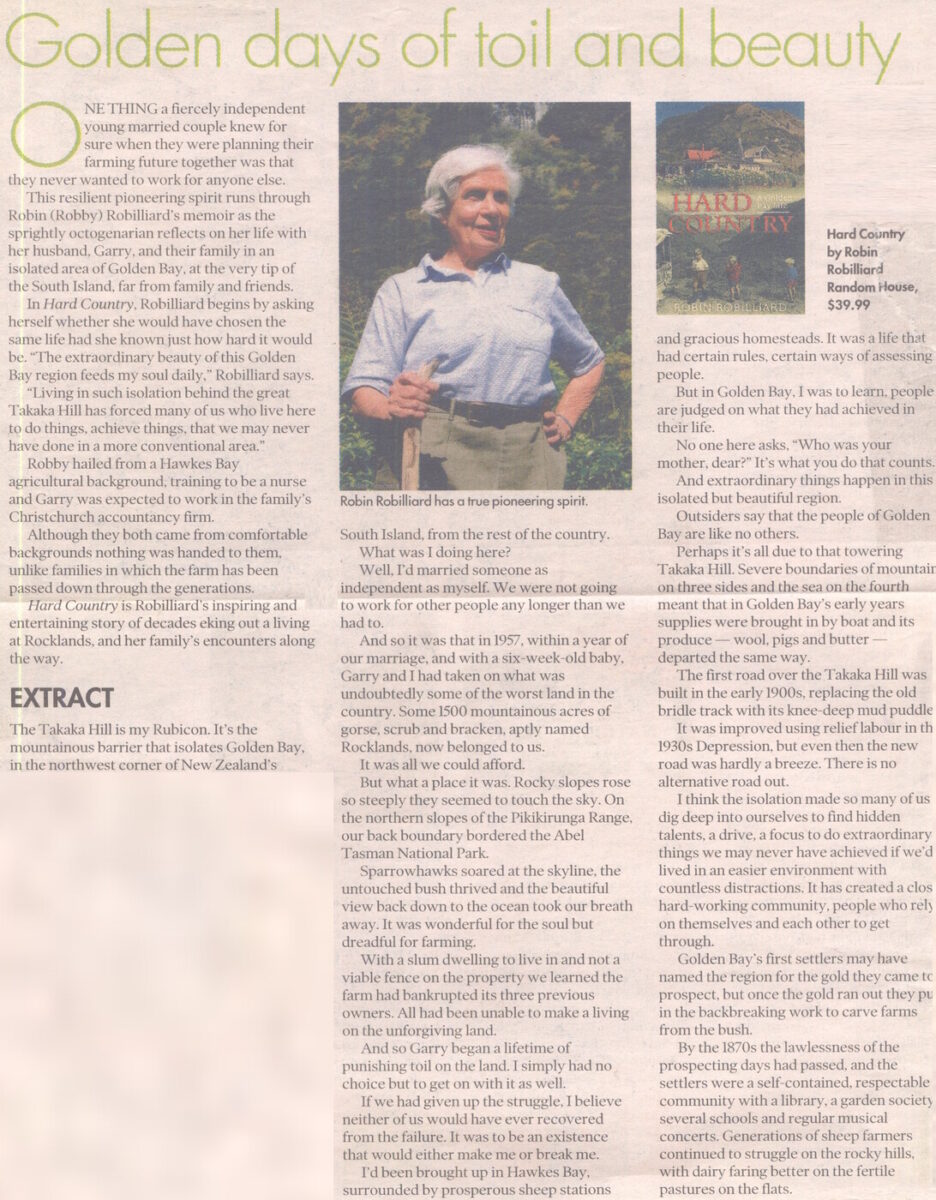Golden days of toil and beauty
ONE THING a fiercely independent young married couple knew for sure when they were planning their farming future together was that they never wanted to work for anyone else.
This resilient pioneering spirit runs through Robin (Robby) Robilliard’s memoir as the sprightly octogenarian reflects on her life with her husband, Garry, and their family in an isolated area of Golden Bay, at the very tip of the South Island, far from family and friends.
In Hard Country, Robilliard begins by asking herself whether she would have chosen the same life had she known just how hard it would be. “The extraordinary beauty of this Golden Bay region feeds my soul daily,” Robilliard says.
“Living in such isolation behind the great Takaka Hill has forced many of us who live here to do things, achieve things, that we may never have done in a more conventional area.”
Robby hailed from a Hawkes Bay agricultural background, training to be a nurse and Garry was expected to work in the family’s Christchurch accountancy firm.
Although they both came from comfortable backgrounds nothing was handed to them, unlike families in which the farm has been passed down through the generations.
Hard Country is Robilliard’s inspiring and entertaining story of decades eking out a living at Rocklands, and her family’s encounters along the way.
EXTRACT
The Takaka Hill is my Rubicon. It’s the mountainous barrier that isolates Golden Bay, in the northwest corner of New Zealand’s South Island, from the rest of the country.
What was I doing here?
Well, I’d married someone as independent as myself. We were not going to work for other people any longer than we had to.
And so it was that in 1957, within a year of our marriage, and with a six-week-old baby, Garry and I had taken on what was undoubtedly some of the worst land in the country. Some 1500 mountainous acres of gorse, scrub and bracken, aptly named Rocklands, now belonged to us.
It was all we could afford.
But what a place it was. Rocky slopes rose so steeply they seemed to touch the sky. On the northern slopes of the Pikikirunga Range, our back boundary bordered the Abel Tasman National Park.
Sparrowhawks soared at the skyline, the untouched bush thrived and the beautiful view back down to the ocean took our breath away. It was wonderful for the soul but dreadful for farming.
With a slum dwelling to live in and not a viable fence on the property we learned the farm had bankrupted its three previous owners. All had been unable to make a living on the unforgiving land.
And so Garry began a lifetime of punishing toil on the land. I simply had no choice but to get on with it as well.
If we had given up the struggle, I believe neither of us would have ever recovered from the failure. It was to be an existence that would either make me or break me.
I’d been brought up in Hawkes Bay, surrounded by prosperous sheep stations and gracious homesteads. It was a life that had certain rules, certain ways of assessing people.
But in Golden Bay, I was to learn, people are judged on what they had achieved in their life.
No one here asks, “Who was your mother, dear?” It’s what you do that counts.
And extraordinary things happen in this isolated but beautiful region.
Outsiders say that the people of Golden Bay are like no others.
Perhaps it’s all due to that towering Takaka Hill. Severe boundaries of mountains on three sides and the sea on the fourth meant that in Golden Bay’s early years supplies were brought in by boat and its produce – wool, pigs and butter – departed the same way.
The first road over the Takaka Hill was built in the early 1900s, replacing the old bridle track with its knee-deep mud puddles.
It was improved using relief labour in the 1930s Depression, but even then the new road was hardly a breeze. There is no alternative road out.
I think the isolation made so many of us dig deep into ourselves to find hidden talents, a drive, a focus to do extraordinary things we may never have achieved if we’d lived in an easier environment with countless distractions. It has created a close hard-working community, people who relied on themselves and each other to get through.
Golden Bay’s first settlers may have named the region for the gold they came to prospect, but once the gold ran out they put in the backbreaking work to carve farms from the bush.
By the 1870s the lawlessness of the prospecting days had passed, and the settlers were a self-contained, respectable community with a library, a garden society, several schools and regular musical concerts. Generations of sheep farmers continued to struggle on the rocky hills, with dairy faring better on the fertile pastures on the flats.
Photo captions –
Hard Country by Robin Robilliard
Random House, $39.99
Robin Robilliard has a true pioneering spirit.












Do you know something about this record?
Please note we cannot verify the accuracy of any information posted by the community.